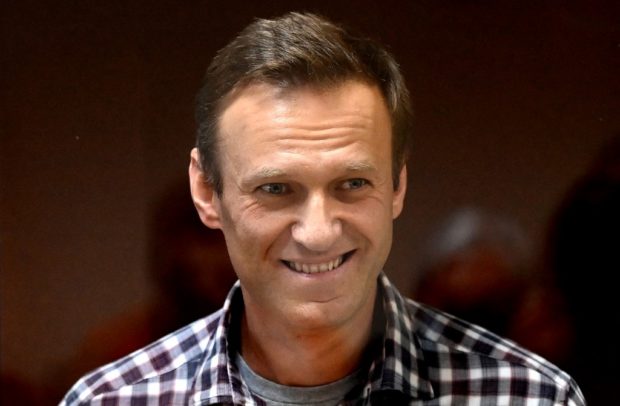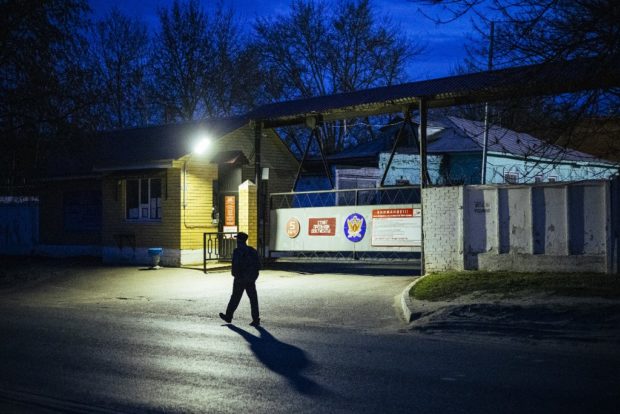Russia moves Navalny to prison hospital under Western pressure

In this file photo taken on February 20, 2021 Russian opposition leader Alexei Navalny stands inside a glass cell during a court hearing at the Babushkinsky district court in Moscow. The United States on April 18, 2021 warned Russia of “consequences” if the hunger-striking Kremlin critic Alexei Navalny dies in prison, as the opposition politician’s team called for mass protests across Russia to help save his life. Photo by Kirill KUDRYAVTSEV / AFP
MOSCOW — Ailing Kremlin critic Alexei Navalny has been transferred to a prison hospital as the EU warned it would hold Moscow responsible for the state of his health.
The United States on Sunday threatened Russia with “consequences” if President Vladimir Putin’s most prominent domestic opponent dies in jail.
Navalny launched a hunger strike three weeks ago and his private doctors warned over the weekend he could die at “any minute”.
Russia’s prison service, which has barred the dissident’s medical team from visiting him, said Monday its doctors had decided to move him to a medical facility at another penal colony outside Moscow.
But it insisted the anti-corruption campaigner’s condition was “satisfactory”, and said he was taking vitamin supplements as part of medical treatment.
Article continues after this advertisementFears over Navalny’s fate have further worsened relations between Moscow and the West, already strained over a Russian troop build-up along the border with Ukraine and a diplomatic row with EU member state the Czech Republic.
Article continues after this advertisementAs the European Union’s 27 foreign ministers held virtual talks Monday, EU foreign policy chief Josep Borrell said the bloc held the Russian authorities responsible for Navalny’s health.
Germany said the EU would be closely watching to ensure Navalny received the necessary care, while Britain urged Navalny’s release.

A man walks next the gate of the IK-3 penal colony where jailed Kremlin critic Alexei Navalny was reportedly transferred in the city of Vladimir on April 19, 2021. Russia’s penitentiary service said on April 19, 2021, it was transferring ailing Kremlin critic Alexei Navalny to a prison hospital, as the EU warned it would hold Moscow responsible for the state of his health. The United States on Sunday threatened Russia with “consequences” if President Vladimir Putin’s major domestic opponent — who launched a hunger strike three weeks ago — dies in jail, with Navalny’s private doctors warning at the weekend he could pass away at “any minute”. Photo by Dimitar DILKOFF / AFP
Russia dismisses protests
The Kremlin has dismissed the outcry from foreign leaders over the condition of the 44-year-old, who last year came close to death after being poisoned with the nerve agent Novichok.
“The health of convicts in the Russia Federation cannot and should not be a topic concerning them,” Putin’s spokesman Dmitry Peskov said.
Navalny was arrested in Russia in January after returning from being treated in Germany for the August poisoning, which he says was carried out by Moscow — an accusation denied by Putin’s administration.
Sentenced to two-and-a-half years in prison for embezzlement — charges he says are politically motivated — Navalny began a hunger strike on March 31 demanding medical treatment for back pain and numbness to his hands and legs.
The EU in October imposed sanctions on six Russian officials over the nerve agent attack, and in February added another four individuals over Navalny’s arrest and sentencing.
The dissident’s supporters have called for major rallies on Wednesday to demand his release, scheduled just hours after Putin delivers his state-of-the-nation address.
But police, who detained thousands during earlier protests, warned people not to demonstrate.
And Russia’s anti-monopoly regulator said Monday it was investigating YouTube for making “biased” decisions about comment moderation on the platform often used by Navalny for calls to protest.
His spokeswoman Kira Yarmysh tweeted Monday that YouTube had notified her Russia’s media regulator had ordered the company to delete a video calling for Wednesday’s demonstrations.
‘Red lines’
The fraught ties with Russia dominated the agenda as EU foreign ministers held their regular monthly meeting.
They held talks with Ukrainian Foreign Minister Dmytro Kuleba over the Russian troop build-up along the country’s eastern border and the surge in fighting with Russian-backed separatists.
The EU said more than 100,000 Russian troops were now massed along Ukraine’s borders and in the annexed Crimea peninsula, scaling down Borrell’s earlier comment on the numbers.
A Pentagon spokesman said Moscow’s military build-up on the border is even bigger than in 2014 when Russia invaded Crimea.
Later Monday, the US State Department branded Kremlin plans to block parts of the Black Sea — which could ultimately impact access to Ukrainian ports — as an “unprovoked escalation”.
Kiev has been battling Moscow-backed separatists in eastern Ukraine since 2014 and fighting intensified early this year, effectively shredding a ceasefire agreed last July.
On Twitter, Kuleba proposed more sanctions “to discourage Moscow from further escalation”.
EU foreign ministers are also set to be briefed on the new tensions between Russia and the Czech Republic.
Moscow on Sunday ordered 20 Czech diplomats to leave the country, a day after Prague announced it was expelling 18 Russian diplomats identified as agents of the SVR and GRU security services.
Czech authorities accused them of involvement in a 2014 explosion on its soil at a military ammunition warehouse that killed two people.
Czech police said they were seeking two Russians in connection with the explosion — and that the passport photos they carried matched those used by suspects in the 2018 poisoning of former Russian double agent Sergei Skripal in Britain.
The EU said the Czech Republic had its “full support”, adding that they were deeply concerned by the “negative pattern of dangerous malign behavior by Russia in Europe”.